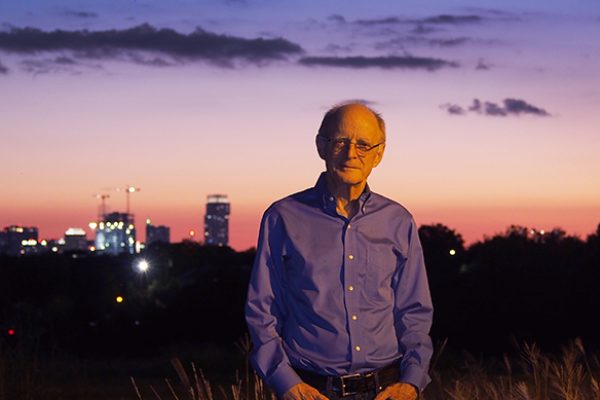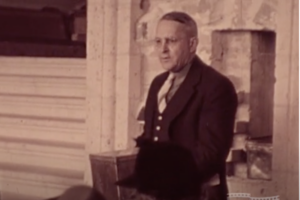After years of analyzing the human response to large-scale events, such as the volcanic eruption of Mount St. Helens in Washington and the bombing of the Oklahoma City federal building, James Pennebaker turned to tracking the effects of the 9/11 attacks in 2001. The psychology and psychiatry professor says he figured that would be the end of his disaster-related research.
“I thought, ‘OK, that’s it. I don’t need to do any more upheavals,’” Pennebaker says. “And then it was mid-March, and you could see this storm coming on the horizon — it looked so interesting.”
Days before The University of Texas officially closed down last spring in response to the spread of COVID-19, Pennebaker was thinking about the possible psychological effects of a global pandemic in today’s world. He messaged the students in his lab to gauge interest in such a study. Psychology graduate student Ashwini Ashokkumar offered to help out and later became the first author of this effort.
By March 17, 2020, the two had created and released a questionnaire, which asked participants to write freely about their thoughts and feelings related to the coronavirus outbreak. By the end of the year, the survey had tremendous reach — it was translated into roughly 10 other languages to collect international data and had over 20,000 respondents.
“It was more than we could handle,” Ashokkumar says. But responses “kept coming in.”
In addition to this, Pennebaker wanted to see whether the effects of the pandemic were apparent on social media. He chose to focus on Reddit, a platform that groups people with similar interests into community pages called subreddits. Using a text analysis program, he and Ashokkumar scanned users’ language on the subreddits of about 20 of the largest U.S. cities, including Austin.
Together, the questionnaire responses and text analysis discoveries make up what Pennebaker calls the Pandemic Project. This “social psychology initiative,” as its website describes it, aims to discover the ways in which COVID-19 has changed the social fabric of our country.
Pennebaker and Ashokkumar’s current paper focuses on the first three months of the pandemic, March through May 2020. An expected initial finding from both the survey and the Reddit data was the extreme spike in references to anxiety-related words.
“The anxiety levels were stunning,” Pennebaker says.
These numbers peaked in mid-March, “when no one knew what to do,” Ashokkumar says. Since then, however, they have leveled back out to relatively normal rates, she says.
Increased levels of anxiety and other emotions led to a decrease in rational thinking, Pennebaker says.
“When we’re under a lot of stress, we get stupid,” he says. “We’re not thinking logically, formally.” It took “months and months” for our thinking to return to typical levels, he says.
The coronavirus outbreak is unique from other prolonged crises, like wars, says Ashokkumar, because we are unable to cope in normal ways.
“A huge aspect of coping is coming together with others,” she says. “Everyone’s home, and people are depressed. That means it’s hard to cope.”
As the pandemic persisted, it became difficult to track the exact origin of certain emotions, such as anxiety and anger, Ashokkumar says. Other events, such as the rise of the Black Lives Matter movement and the 2020 U.S. presidential election, likely contributed to these feelings, too.
But the coronavirus compelled us to confront these issues, Pennebaker says. “It forced us to stay in, slow down and watch the news more than we normally would,” he says. “It forced America to look. … That had a really big effect.”
This spring and summer, Pennebaker and Ashokkumar plan to analyze the remaining months of the pandemic, as well as its aftermath. They say they are interested to see how we react as the outbreak comes to an end.
“I’m curious to see how long it will take us to adapt,” Ashokkumar says.
“The pandemic is a profoundly important chapter in the lives of Americans and the world,” Pennebaker says. “I view our lab’s contribution as trying to capture the human psychological and cognitive toll at a level that we have never seen before.”




